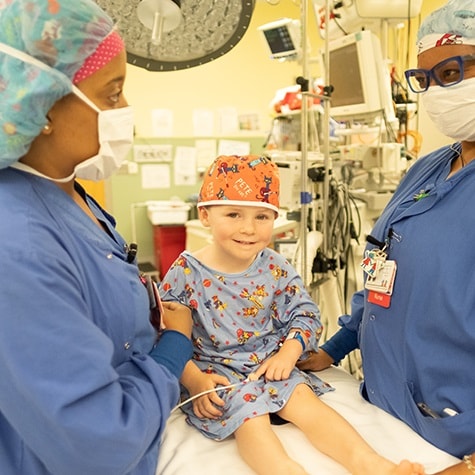Joseph K. Williams, MD, is Chief of Plastic Surgery at Children’s Healthcare of Atlanta Scottish Rite Hospital and Director of Research at the Center for Cleft and Craniofacial Disorders at Children’s. He is also an Associate Professor at Emory University School of Medicine in the Division of Plastic Surgery. Dr. Williams focuses on cleft lip and palate repairs, craniofacial and dentofacial abnormalities, and hemangiomas.
This content is general information and is not specific medical advice. Always consult with a doctor or healthcare provider if you have any questions or concerns about the health of a child. In case of an urgent concern or emergency, call 911 or go to the nearest emergency department right away. Some physicians and affiliated healthcare professionals on the Children’s Healthcare of Atlanta team are independent providers and are not our employees.
Implementing ERAS Principles in Pediatric Care
Exploring ways to accelerate post-op recovery and pain relief
For more than 20 years, enhanced recovery after surgery (ERAS) principles have been successfully applied in the medical care of adults. However, despite significant success in optimizing organ function, reducing the psychological stress of surgery and providing effective pain control, ERAS principles have not been widely adopted in pediatric care.

Can ERAS principles be effective for pediatric surgery recovery?
For more than 20 years, enhanced recovery after surgery (ERAS) principles have been successfully applied in the medical care of adults. However, despite significant success in optimizing organ function, reducing the psychological stress of surgery and providing effective pain control, ERAS principles have not been widely adopted in pediatric care.
“A team of surgeons here at Children’s Healthcare of Atlanta identified an opportunity to implement a modified ERAS protocol in pediatric patients who are undergoing cleft palate repair,” explains Joseph K. Williams, MD, Chief of Plastic Surgery at Children’s Healthcare of Atlanta at Scottish Rite hospital and Director of Research at the Center for Cleft and Craniofacial Disorders at Children’s. “Similar to how ERAS has benefited adult patients, we hope this will accelerate post-operative recovery and optimize pain control while also limiting narcotic use for our pediatric patients.”
Dr. Williams and Stefanie Hush, MMSc, PA-C, a physician assistant on the plastic surgery team, spear-headed the initiative. Along with Colin M. Brady, MD, and Magdalena Soldanska, MD, a coordinated effort was made to create dialogue with all involved healthcare workers in the care circle, including anesthesiologists, nurses, and other APPs.
The ERAS protocol adopted for patients who underwent cleft palate repair at Children’s focused on three phases of surgical care: pre-, intra- and post-operative.
What are key components of the ERAS protocol at Children’s?
- Pre-operative patient education
- Reduction of pre-operative fasting intervals
- Use of minimally invasive surgical techniques when feasible
- Multimodal analgesia
- Regional anesthesia
- Early mobilization to enhance return to premorbid conditioning
“Effective implementation of these six principles required the support of a multidisciplinary team of plastic surgeons, anesthesiologists and perioperative nurses. This initiative is successful because of the commitment of Children’s to advance the care of our pediatric patients, as well as support within our team for this nontraditional method of pain management,” says Dr. Williams.
The ERAS protocol was piloted among cleft palate patients at Children’s from April 2017 to June 2018. During that time, significant outcome improvements were observed in the pilot group when compared with a retrospective analysis of the control group.
Based on the success of the cleft palate ERAS, Children’s is continuing to expand the use of ERAS principles across many pediatric surgical specialties. Currently, Children’s is exploring the use of ERAS principles in a subgroup of palatoplasty patients not included in the initial cleft palate pilot, as well as patients undergoing interventions for velopharyngeal insufficiency. Based on preliminary results, the potential for the application of ERAS principles across many surgical interventions is expansive, and Children’s is leading national multicenter trials on this approach.
We are setting the bar for children who need surgery in Georgia by being the first facility in the state with a Level 1 Children’s Surgery Verification from the American College of Surgeons. There are fewer than 30 verified Level 1 facilities with Children’s Surgery Verification across the country, and we have two.
Clinical Success at Children's

We are the first facility in Georgia with a Level 1 Children’s Surgery Verification.
We have earned Level 1 status from the American College of Surgeons for Children’s Surgery Verification—its highest designation. No other hospitals in Georgia have achieved this level. So when your child needs surgery, you can take comfort in knowing he is in a facility that meets the highest distinction.
Learn moreContact Us 404-785-DOCS (3627)







